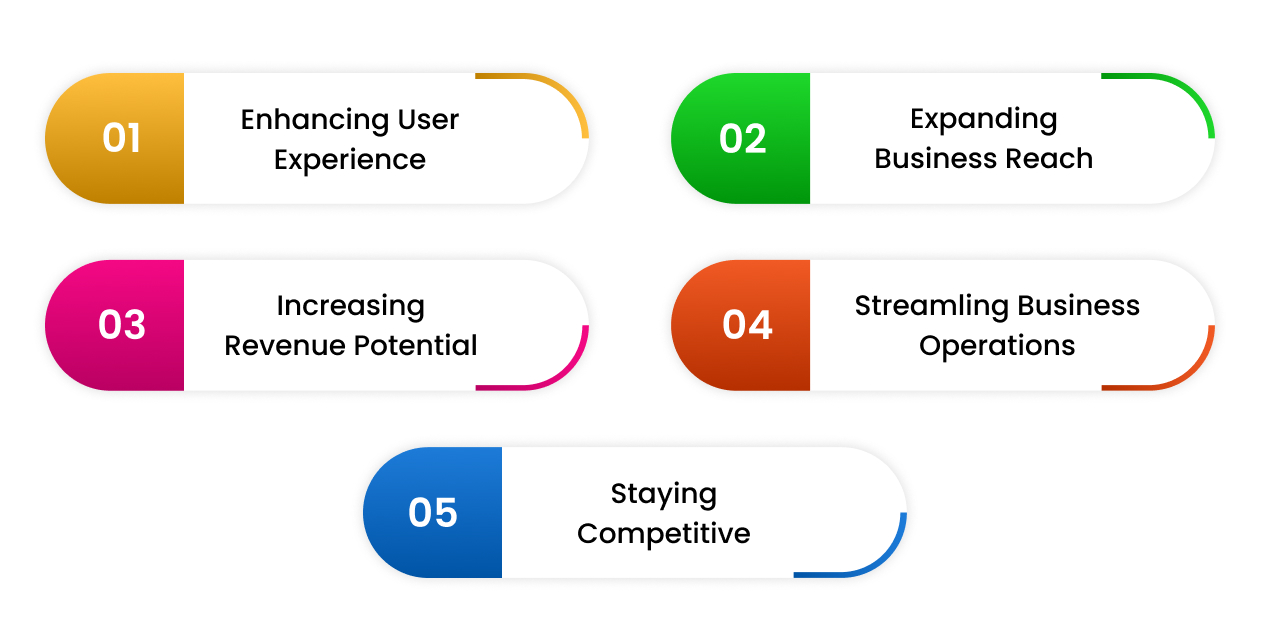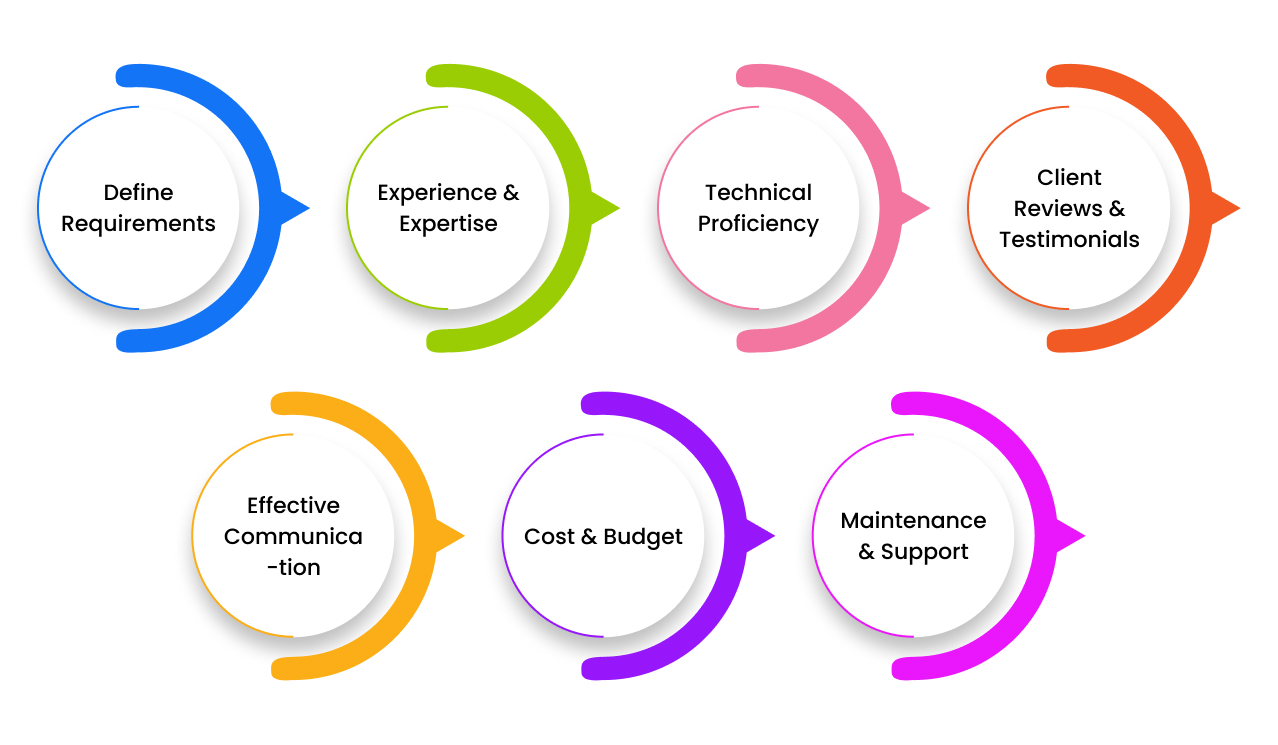- Mar 12, 2024
- Mobile App Development
- 20008
Share this post on:

Nowadays, the world relies heavily on mobile applications for convenience and efficiency. There are numerous mobile apps being created or launched on the Play Store. However, not all mobile apps are successful. A great mobile app can make a lot of difference in terms of user experience, functionality, and overall success.
So, why should you care about mobile app development?
Simply put, poorly developed apps can negatively impact your life in many ways. They may crash frequently, drain your battery quickly, or fail to provide accurate information. These issues can cause frustration and harm if they prevent you from accessing crucial services like emergency medical assistance or transportation options. On the other hand, well-designed apps can save time, reduce stress, and improve safety by making essential tools easily accessible.
Mobile app's development goes beyond just improving individual experiences. It has the potential to drive economic growth and innovation as well. Companies can create new revenue streams, enhance customer loyalty, and differentiate themselves from competitors by investing in quality app development.
How great Mobile App Development benefits your business
Mobile apps have revolutionized the way we interact with technology, offering premium benefits to all businesses.

Enhancing User Experience: Mobile apps offer a seamless and optimized experience on smartphones and tablets. Apps are built with a mobile-first approach, ensuring that users can easily navigate and interact with the content. Moreover, mobile apps offer a range of features and functionalities tailored to meet the specific needs of users. Whether it's accessing personalized content, receiving push notifications, or utilizing device-specific capabilities like GPS or cameras, apps provide a more immersive and engaging experience.
Expanding Business Reach: Mobile app development offers businesses unique opportunities to expand their reach and connect with a large audience. A mobile app allows businesses to tap into a vast market and reach potential customers who prefer mobile devices. These apps allow businesses to send targeted messages, promotions, and updates directly to users' devices, increasing engagement and driving customer loyalty using push notifications. Moreover, apps can leverage location-based services to provide users with relevant information based on their geographical location, further enhancing the user experience.
Increasing Revenue Potential: Mobile app development also plays a significant role in increasing revenue potential for businesses. Businesses can monetize their apps and generate additional income streams by offering in-app purchases, subscriptions, or advertising opportunities. In-app purchases allow users to unlock premium features or content, while subscriptions provide recurring revenue for services like streaming platforms or news publications. Furthermore, mobile apps can serve as a platform for targeted advertising. By collecting user data and preferences, businesses can deliver personalized ads to users, increasing the chances of conversion and maximizing ad revenue.
Streamlining Business Operations: Mobile app development is beneficial for customer-facing businesses and for the internal operations of businesses. Enterprise mobile apps streamline business processes, improve productivity, and enhance collaboration among employees. These apps can automate repetitive tasks, provide real-time access to data and analytics, and facilitate communication between team members.
Businesses can optimize their workflows, reduce manual errors, and increase efficiency by leveraging mobile apps. For example, field service technicians can use mobile apps to access work orders, update job statuses, and capture customer signatures on-site.
Staying Competitive: In today's highly competitive market, having a mobile app has become a necessity rather than a luxury. Businesses that fail to adapt to the mobile-first mindset risk losing out to competitors who have embraced mobile app development. Mobile apps provide a competitive edge and contribute to brand visibility and recognition. A well-designed and functional mobile app demonstrates a commitment to innovation and customer satisfaction. It allows businesses to differentiate themselves from competitors and build a loyal customer base. Moreover, positive user experiences with the app can lead to word-of-mouth recommendations and positive reviews, further enhancing the brand's reputation.
Key mistakes in mobile app development that businesses must avoid
With the increasing demand for mobile applications, it is crucial to ensure that the development process is executed flawlessly. However, there are several common mistakes that developers make, leading to subpar user experiences and unsuccessful apps.
 Neglecting User Experience (UX): A crucial aspect of mobile app development is providing an exceptional user experience. Neglecting UX can result in users abandoning the app and seeking alternatives. To avoid this mistake, developers should focus on creating intuitive and user-friendly interfaces. It includes designing clear navigation paths, minimizing loading times, and optimizing the performance of the app.
Neglecting User Experience (UX): A crucial aspect of mobile app development is providing an exceptional user experience. Neglecting UX can result in users abandoning the app and seeking alternatives. To avoid this mistake, developers should focus on creating intuitive and user-friendly interfaces. It includes designing clear navigation paths, minimizing loading times, and optimizing the performance of the app.
According to statistics, 79% of users leave an app if it does not meet their expectations in terms of performance or usability.
Lack of Platform Optimization: Developers often make the mistake of not optimizing their apps for different platforms. Each platform (iOS, Android, etc.) has its own set of guidelines and design principles that need to be followed for optimal performance and user satisfaction. Ignoring platform-specific requirements can lead to compatibility issues, inconsistent user experiences, and reduced functionality.
Inadequate Testing: Testing is a crucial phase in mobile app development that should never be ignored. Developers should perform functional testing (ensuring all features work as intended) and compatibility testing (verifying the app's performance across different devices and operating systems).
Poor Performance: Mobile app users expect fast and responsive experiences. Failing to optimize the app's performance can lead to slow loading times, unresponsive interfaces, and increased battery consumption. Developers should focus on efficient coding practices, minimize unnecessary network requests, and optimize resource usage to ensure smooth performance.
Lack of Security Measures: Security is crucial in mobile app development. Neglecting security measures can expose user data to potential breaches, leading to severe consequences for users and businesses. Developers should implement secure coding practices, encrypt sensitive data, and regularly update the app to address any identified vulnerabilities.
Steps to take while choosing a mobile app development company
With the increasing demand for mobile apps, there are numerous companies offering mobile app development services. However, not all companies are created equal, and it is crucial to carefully evaluate and select a company that aligns with your specific requirements and goals.

Define Requirements: Before starting your search for a mobile app development company, define the purpose of your app, its target audience, the features and functionalities you want to include, and any specific platforms or technologies. Knowing your requirements will help you communicate your needs effectively to potential development companies and ensure that they can meet your expectations.
Experience and Expertise: Always look for companies that have a proven track record of developing successful apps in your industry or niche. Check their portfolio to see if they have worked on similar projects before and if their design and development skills align with your vision.
Consider the number of years the company has been in business and its overall reputation in the industry. A well-established company with a strong reputation is more likely to deliver high-quality results to that of a newly formed or unknown company.
Technical Proficiency: Mobile app development requires expertise in various technologies and programming languages. Ensure that the company you choose has a team of skilled professionals who are proficient in the required technologies such as iOS, Android, hybrid frameworks, backend development, UI/UX design, etc. Ask about their development process and methodologies to understand how they approach projects and ensure that they follow industry best practices. Additionally, inquire about their ability to handle future updates, maintenance, and support for your app.
Client Review and Testimonials: Reading client reviews and testimonials can provide valuable insights into the company's reputation and the quality of its work. Ensure to look for reviews on social media and their website. You can also reach out to their previous clients directly to inquire about their experience working with the company. It will give you a better understanding of their professionalism, communication skills, adherence to deadlines, and overall client satisfaction.
Effective Communication: Effective communication and collaboration are crucial for the success of any development project. Ensure that the company has a clear communication process in place and is responsive to your queries and concerns. They should be able to understand your requirements, provide regular updates on the progress of your project, and involve you in decision-making processes.
Cost and Budget: It is crucial to consider your budget when choosing a mobile app development company. Different companies have different pricing models, so it is essential to understand their pricing structure and ensure that it aligns with your budget. Ensure to avoid choosing a company solely based on low cost as it may compromise the quality of the app or result in hidden costs later on.
Maintenance and Support: Mobile app development is an ongoing process that requires regular updates, bug fixes, and maintenance. Inquire about the company's post-development support services and their ability to provide timely updates and support when needed.
Ensure that they offer a warranty period during which they will fix any issues or bugs that arise after the launch of your app. Additionally, discuss long-term maintenance plans and associated costs to ensure the longevity and smooth functioning of your app.
The Future of Mobile App Development
The future of mobile app development is affected by several trends and advancements. These trends are driven by technological innovations, changing user preferences, and the evolving needs of businesses. In this comprehensive response, we will explore these trends in detail.

Artificial Intelligence and Machine Learning: Artificial Intelligence and Machine Learning technologies are revolutionizing the mobile app development landscape. AI-powered apps can provide personalized experiences, predictive analytics, and intelligent automation. With AI and ML, mobile apps can understand user behavior, preferences, and patterns to deliver highly tailored content and recommendations.
Internet of Things (IoT): The Internet of Things is a network of interconnected devices that communicate with each other through the Internet. As IoT continues to expand its reach into various industries such as healthcare, smart homes, transportation, and agriculture, mobile app developers will need to adapt to this trend. Mobile apps will be required to integrate seamlessly with IoT devices, enabling users to control and monitor them remotely. This integration will create new opportunities for innovative mobile app solutions that enhance efficiency, convenience, and automation in various domains.
Augmented Reality and Virtual Reality: Augmented Reality and Virtual Reality technologies have gained significant traction in recent years, thanks to advancements in hardware capabilities and increased consumer adoption. Mobile app developers are leveraging AR and VR to create immersive experiences in gaming, entertainment, education, training, marketing, and more. AR allows users to overlay digital information onto the real world through their mobile devices' camera viewfinders. VR provides users with fully immersive experiences by simulating a virtual environment.
Progressive Web Apps: PWAs combine the best features of both web and mobile apps, offering fast loading times, offline capabilities, push notifications, and seamless user experiences. They eliminate the need for users to download and install apps from app stores, making them more accessible and convenient.
5G Technology: 5G technology is set to revolutionize mobile app development by providing faster network speeds, lower latency, and increased bandwidth. With 5G, apps can leverage real-time streaming, high-quality video content, augmented reality, and other resource-intensive features without compromising performance. Additionally, 5G will facilitate the growth of IoT devices and their integration with mobile apps by providing a more reliable and responsive network infrastructure.
Conclusion:
In conclusion, mobile app development is of utmost importance in today's digital landscape. It enhances user experience, expands business reach, increases revenue potential, streamlines operations, and helps businesses stay competitive in an ever-evolving market. Embracing mobile app development is no longer an option but a necessity for businesses and individuals looking to thrive in the mobile-first era. So, if you are looking to develop high-quality, robust, and secure mobile apps, OZVID is here for you. We have a team of developers who are well-versed with the latest technology, ensuring that customers get the best and most secure service.











